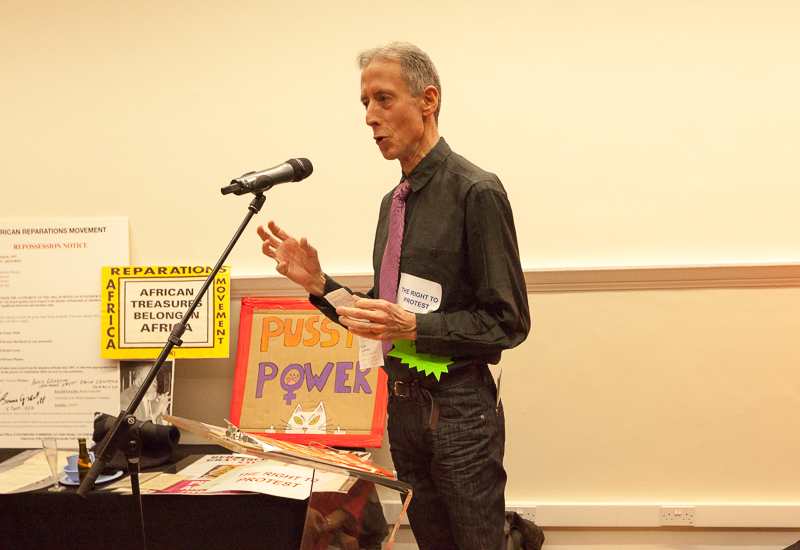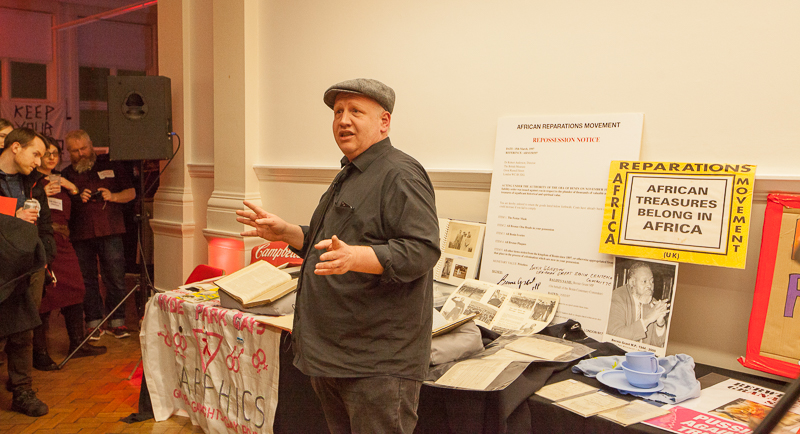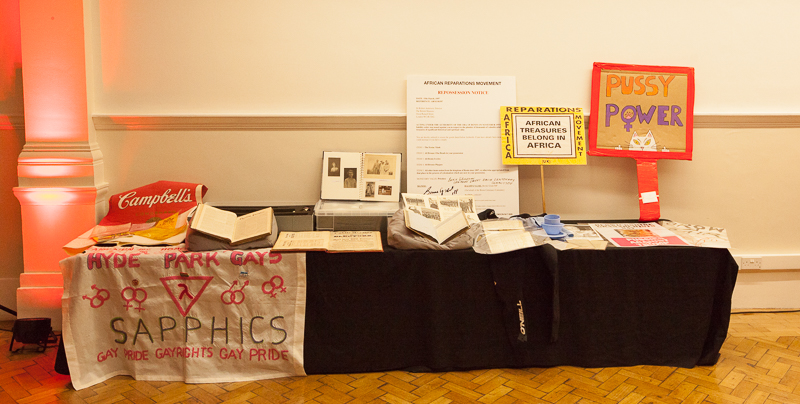30 Jan 18 | News and features, Volume 46.04 Winter 2017, Volume 46.04 Winter 2017 Extras
[vc_row][vc_column][vc_column_text]

Peter Tatchell discusses the importance of the right to protest. (Photo: Sean Gallagher / Index on Censorship)
Index on Censorship magazine celebrated the launch of its winter 2017 magazine at the Bishopsgate Institute in London with an evening exploring the legacies of iconic protests from 1918 and 1968 to the modern day and reflecting on how today, more than ever, our right to protest is under threat.
Speakers for the evening included human rights campaigner Peter Tatchell, Bishopsgate Institute special collections and archives manager Stefan Dickers and artist Patrick Bullock.
Tatchell discussed the importance of protest for any democracy and the significant anniversaries of protests in 2018 throughout his speech. “This year is a very special year, a very historic year, I think that those protests remind us that protest is vital to democracy,” he said. “It is a litmus test of democracy, it is a litmus of a healthy democracy. Democracies that don’t have protest, there is a problem, in fact, you might even say they aren’t true democracies.”
“With 1968 came the birth of the women’s liberation movement, the mass protests in Czechoslovakia against Russian occupation, and, of course, the huge protests against the American war in Vietnam,” Tatchell added. “Those protests all remind us that protest is vital to democracy.”

Bishopsgate Institute special collections and archives manager Stefan Dickers at the launch of What price protest? (Photo: Sean Gallagher / Index on Censorship)
This year also marks the centenary of the right to vote for women in Britain. Dickers showcased artefacts the Bishopsgate Institute’s collection of protest memorabilia, including sashes worn by the Suffragettes and tea sets women were given upon leaving prison for activities related to their activism.

Suffragette sashes at the launch of What price protest? (Photo: Sean Gallagher / Index on Censorship)
Attendees included actor Simon Callow, who stressed the importance of protest and freedom of expression: in an interview at the event with Index on Censorship. “There are all sorts of things that people find inconvenient and uncomfortable to themselves, that they don’t wish to hear, but that’s not the point,” he said. “The point is that if some people feel very strongly that certain things are wrong, then they must be allowed to say something.”

Disobedient objects at the launch of What price protest? (Photo: Sean Gallagher / Index on Censorship)
Eastenders actress Ann Mitchell, who also attended the event, said: “There is no question in my opinion, that the darkness in the world at the moment must be protested against. All the advantages we have won as women, as ethnic minorities, are being destroyed, they are being wiped out. Unless we hear voices of protests for that, that will continue.”
The night concluded with a performance by protest choir Raised Voices.
Index magazine’s winter issue on the right to protest features articles from Argentina, England, Turkey, the USA and Belarus. Activist Micah White proposes a novel way for protest to remain relevant. Author and journalist Robert McCrum revisits the Prague Spring to ask whether it is still remembered. Award-winning author Ariel Dorfman’s new short story — Shakespeare, Cervantes and spies — has it all. Anuradha Roy writes that tired of being harassed and treated as second-class citizens, Indian women are taking to the streets.b
[/vc_column_text][/vc_column][/vc_row][vc_row][vc_column width=”1/3″][vc_custom_heading text=”What price protest?”][vc_column_text]Through features, interviews and illustrations, the winter issue of Index on Censorship magazine looks at the state of protest today, 50 years after 1968, and exposes how it is currently under threat.
With: Ariel Dorfman, Anuradha Roy, Micah White, Richard Ratcliffe[/vc_column_text][/vc_column][vc_column width=”1/3″][vc_single_image image=”96747″ img_size=”medium”][/vc_column][vc_column width=”1/3″][vc_custom_heading text=”Subscribe”][vc_column_text]In print, online. In your mailbox, on your iPad.
Subscription options from £18 or just £1.49 in the App Store for a digital issue.
Every subscriber helps support Index on Censorship’s projects around the world.
 SUBSCRIBE NOW[/vc_column_text][/vc_column][/vc_row]
SUBSCRIBE NOW[/vc_column_text][/vc_column][/vc_row]
18 Dec 17 | Volume 46.04 Winter 2017, Volume 46.04 Winter 2017 Extras
[vc_row][vc_column][vc_column_text][/vc_column_text][/vc_column][/vc_row][vc_row][vc_column][vc_column_text]
The winter issue of Index on Censorship looks at the state of protest 50 years after 1968, the year the world took to the streets.
The podcast includes interviews with Pavel Theiner, who was 11 years old when the tanks rolled into Prague in 1968. Speaking on the state of protest today is Steven Borowiec, a journalist based in South Korea, whose article in the magazine looks at whether the current leader, who came to power on the back of protests, will protect this necessary right. And Sujatro Ghosh, an Indian photographer, discusses his innovative project to highlight the unfair treatment of women in the country.
Also on the podcast is an interview with Floyd Abrams, the lawyer who worked on the Pentagon Papers case. He discusses how the First Amendment has not been under this much attack since World War I.
Print copies of the magazine are available on Amazon, or you can take out a digital subscription via Exact Editions. Copies are also available at the BFI, the Serpentine Gallery, MagCulture, (London), News from Nowhere (Liverpool), Home (Manchester) and on Amazon. Each magazine sale helps Index on Censorship continue its fight for free expression worldwide.
[/vc_column_text][/vc_column][/vc_row][vc_row][vc_column width=”1/3″][vc_custom_heading text=”What price protest?”][vc_column_text]Through features, interviews and illustrations, the winter issue of Index on Censorship magazine looks at the state of protest today, 50 years after 1968, and exposes how it is currently under threat.
With: Ariel Dorfman, Anuradha Roy, Micah White, Richard Ratcliffe[/vc_column_text][/vc_column][vc_column width=”1/3″][vc_single_image image=”96747″ img_size=”medium”][/vc_column][vc_column width=”1/3″][vc_custom_heading text=”Subscribe”][vc_column_text]In print, online. In your mailbox, on your iPad.
Subscription options from £18 or just £1.49 in the App Store for a digital issue.
Every subscriber helps support Index on Censorship’s projects around the world.
 SUBSCRIBE NOW[/vc_column_text][/vc_column][/vc_row]
SUBSCRIBE NOW[/vc_column_text][/vc_column][/vc_row]
06 Dec 17 | Magazine, Magazine Contents, Volume 46.04 Winter 2017
[vc_row][vc_column][vc_custom_heading text=”With contributions from Ariel Dorfman, Robert McCrum, Micah White and Anuradha Roy, as well as interviews with Richard Ratcliffe, Emmanuel Laurentin, Floyd Abrams and Buscarita Roa”][/vc_column][/vc_row][vc_row][vc_column][vc_column_text]
In homage to the 50th anniversary of 1968, the year the world took to the streets, the winter issue of Index on Censorship magazine looks at all aspects related to protest.
We explore the most noteworthy and effective protests of the past, as journalist and author Robert McCrum returns to Prague; we cast light on the most interesting and effective protests now, from India and South Korea through to South Africa and Hungary, via Argentina and its protesting grandmothers; we look at why protest still matters, including an interview with Richard Ratcliffe, husband of imprisoned mother Nazanin Zaghari-Ratcliffe; and finally we look to the future of protest in an article from Occupy co-founder Micah White.
[/vc_column_text][/vc_column][/vc_row][vc_row][vc_column][vc_single_image image=”96747″ img_size=”full”][/vc_column][/vc_row][vc_row][vc_column][vc_column_text]
In some of pieces we see how the spirit of ’68 directly lives on. In France, for example, leading journalist historian Emmanuel Laurentin tells Sally Gimson that the young people protesting in ‘68 have been very influential in France since, and that the country holds its revolutionary past dear.
But it’s not all positive. We reveal new research that shows an increase in threats against journalists covering protests, as well as looking at how cities across England are selling off land to private owners and in so doing compromising our basic democratic rights. Articles from Turkey, Egypt and Latin America highlight the increasing dangers attached to going out into the streets and who is still taking the risk.
Outside the special report, the lawyer who represented the New York Times in the Pentagon Papers talks about the constitutional crisis affecting the USA today. And on a different note, we look at how musicians are being silenced in Catalan, whilst elsewhere people are being made to sing, the national anthem in this instance.
Finally, do not miss our exclusive short story from award-winning writer Ariel Dorfman. It features Shakespeare, Cervantes and spies, the perfect trio for a work of fiction.
[/vc_column_text][/vc_column][vc_column][/vc_column][/vc_row][vc_row][vc_column][vc_custom_heading text=”Special report: What price protest?”][vc_column_text]
Toxic environment, by Kaya Genç: Five years after Gezi Park, people in Turkey have given up on public space and retreated online
Is protesting pointless? by Micah White: One of the co-founders of Occupy proposes a novel way for protest to remain relevant
Square bashing, by Sally Gimson: English cities are giving away basic democratic rights when they sell off management of central streets, our report shows
Demonstration by design, by Danyaal Yasin: Banners are so 1968 as these new protests show the 2017 look is extremely creative
Stripsearch, by Martin Rowson: The world’s dictators have taken to the streets. What do they really, really want?
Meeting the oldest protesters in town, by Lucia He: An interview with one of Argentina’s famous grandmothers about decades of campaigning
Under a cloud, by Duncan Tucker: Tear gas, violence and new laws are all being used to frighten Latin American protesters into giving up
Green light from the Blue House? by Steven Borowiec: He came to power arguing he could protect protest, but is South Korea’s new president doing what he promised?
Return to the streets, by Raymond Joseph: Anti-apartheid demonstrators thought they had hung up their placards, but now they are back on protests
China’s middle class rebellion, by Robert Foyle Hunwick: There are cracks in the Chinese dream, and now the middle class is getting angry
“I see you”, by Rachael Jolley: The husband of imprisoned mother Nazanin Zaghari-Ratcliffe talks to Index about why protest matters
Having the last laugh, by Csabi Tasi and Jemimah Steinfeld: Meet the party injecting humour into Hungarian politics and challenging the status quo
1968 and all that, by Sally Gimson: One of France’s leading journalistic historians discusses the new style of French protest
Wrongs threatening our rights, by Raj Chadda: A lawyer advises on increasing conditions being imposed on protests by UK police
Women walk out, by Shilpa Phadke and Anuradha Roy: Tired of being harassed and treated as second class citizens, Indian women are taking to the streets
It’s Spring again, by Robert McCrum: Fifty years after the Prague Spring, the author and journalist visits to ask whether it is still remembered. Also Pavel Theiner reflects on 1968
Mapping attacks, by Ryan McChrystal: Index reveals new research showing a rise in the dangers journalists face covering protests in Europe
“There was no outrage”, by Wael Eskandar: An Egyptian journalist on witnessing the dangers – and death – of protest in his country
[/vc_column_text][/vc_column][/vc_row][vc_row][vc_column][vc_custom_heading text=”Column”][vc_column_text]
Global view, by Jodie Ginsberg: We need to champion free speech for all or risk the far-right controlling the conversation
[/vc_column_text][/vc_column][/vc_row][vc_row][vc_column][vc_custom_heading text=”In focus”][vc_column_text]
They can’t stop the music, by Silvia Nortes and Dominic Hinde: Artistic freedom in the run-up to the referendums in Scotland and Catalonia are compared. Catalonia loses
Book fairs and their freedoms, by Dominic Hinde, Ola Larsmo, Tobias Voss and Jean-Paul Marthoz: Controversies at Frankfurt and Gothenburg book fairs are leading to arguments about the freedom to speak and appear at these events
First Amendment comes under fire, by Jan Fox: An interview with the lawyer who represented the New York Times in the Pentagon Papers case on the constitutional crisis hitting the USA today
Making the cut, by Wana Udobang: One of Nollywood’s leading directors on what it’s like working in the second biggest film industry in the world
[/vc_column_text][/vc_column][/vc_row][vc_row][vc_column][vc_custom_heading text=”Culture”][vc_column_text]
Spying for Shakespeare: An interview by Rachael Jolley with playwright Ariel Dorfman and introduction to his new short story, Saving Will and Miguel, with themes of Shakespeare, Cervantes and spies. This story for Index from the award-winning writer has it all
[/vc_column_text][/vc_column][/vc_row][vc_row][vc_column][vc_custom_heading text=”Column”][vc_column_text]
Index around the world, by Danyaal Yasin: We’ve live broadcast an event and become UK partner on Banned Books Week, just two recent Index highlights
[/vc_column_text][/vc_column][/vc_row][vc_row][vc_column][vc_custom_heading text=”Endnote”][vc_column_text]
Blurred lines, by Jemimah Steinfeld: National anthems are back in fashion. Why and where are people being forced to sing against their will?
[/vc_column_text][/vc_column][/vc_row][vc_row content_placement=”top”][vc_column width=”1/3″][vc_custom_heading text=”What price protest?” font_container=”tag:p|font_size:24|text_align:left” link=”url:https%3A%2F%2Fwww.indexoncensorship.org%2F2017%2F12%2Fwhat-price-protest%2F%20|||”][vc_column_text]Through a range of in-depth reporting, interviews and illustrations, the summer 2017 issue of Index on Censorship magazine explores the 50th anniversary of 1968, the year the world took to the streets, to look at all aspects related to protest.
With: Micah White, Robert McCrum, Ariel Dorfman, Anuradha Roy and more.[/vc_column_text][/vc_column][vc_column width=”1/3″][vc_single_image image=”96747″ img_size=”medium” alignment=”center” onclick=”custom_link” link=”https://www.indexoncensorship.org/2017/12/what-price-protest/”][/vc_column][vc_column width=”1/3″ css=”.vc_custom_1481888488328{padding-bottom: 50px !important;}”][vc_custom_heading text=”Subscribe” font_container=”tag:p|font_size:24|text_align:left” link=”url:https%3A%2F%2Fwww.indexoncensorship.org%2Fsubscribe%2F|||”][vc_column_text]In print, online. In your mailbox, on your iPad.
Subscription options from £18 or just £1.49 in the App Store for a digital issue.
Every subscriber helps support Index on Censorship’s projects around the world.
 SUBSCRIBE NOW[/vc_column_text][/vc_column][/vc_row]
SUBSCRIBE NOW[/vc_column_text][/vc_column][/vc_row]




![]() SUBSCRIBE NOW[/vc_column_text][/vc_column][/vc_row]
SUBSCRIBE NOW[/vc_column_text][/vc_column][/vc_row]![]() SUBSCRIBE NOW[/vc_column_text][/vc_column][/vc_row]
SUBSCRIBE NOW[/vc_column_text][/vc_column][/vc_row]![]() SUBSCRIBE NOW[/vc_column_text][/vc_column][/vc_row]
SUBSCRIBE NOW[/vc_column_text][/vc_column][/vc_row]